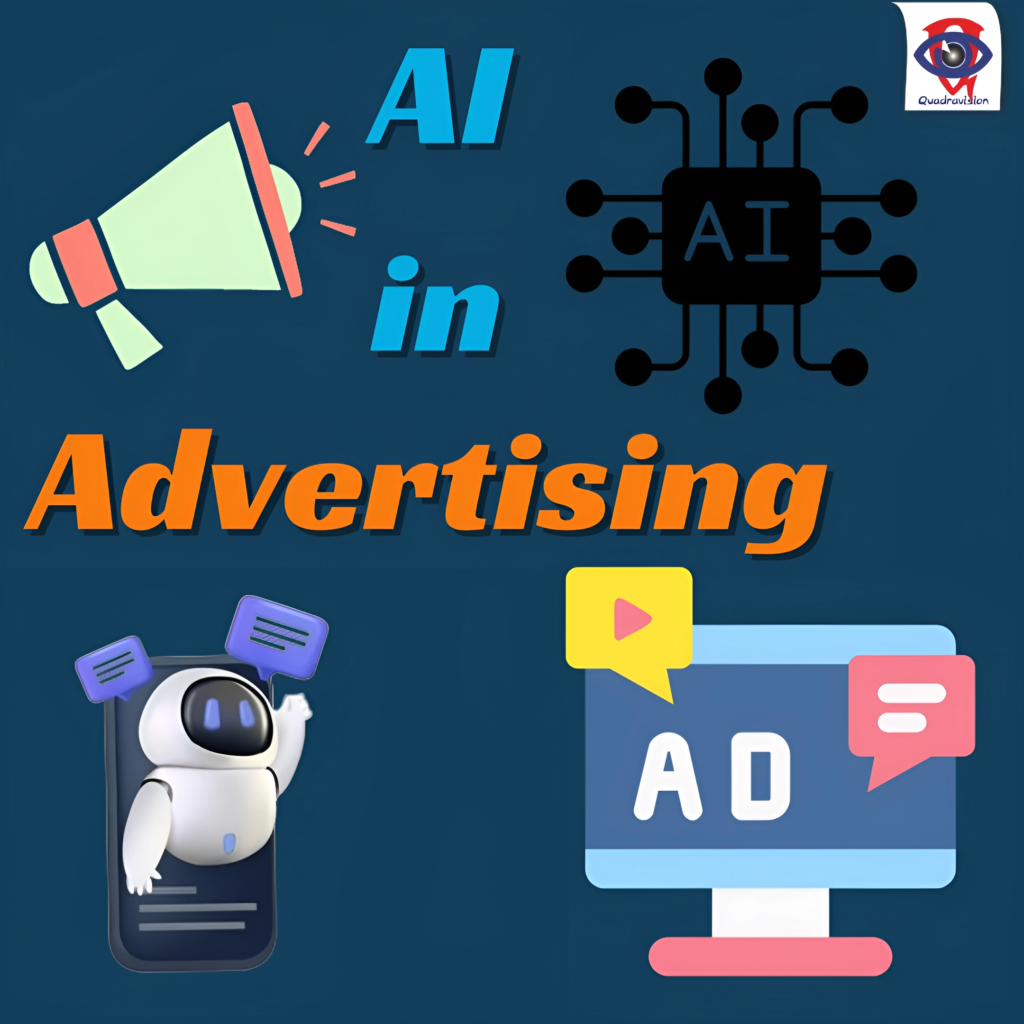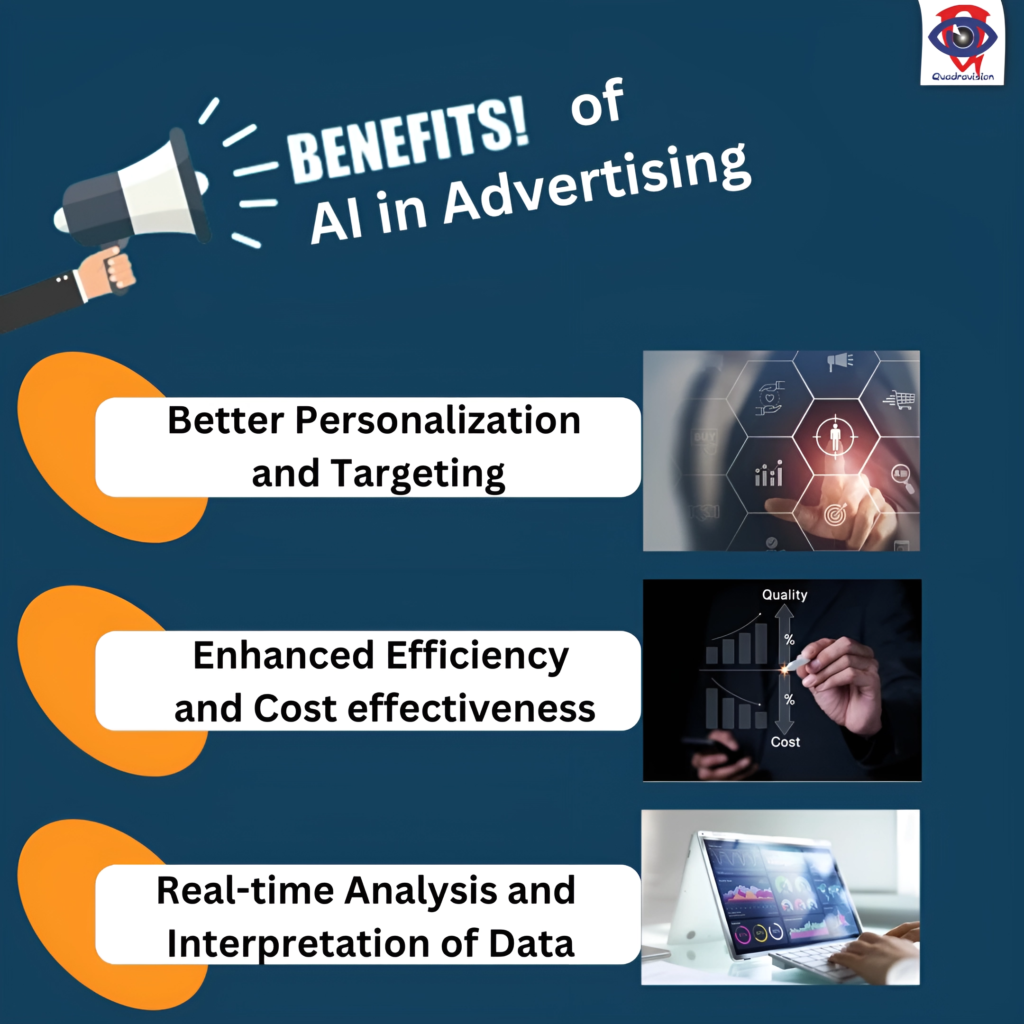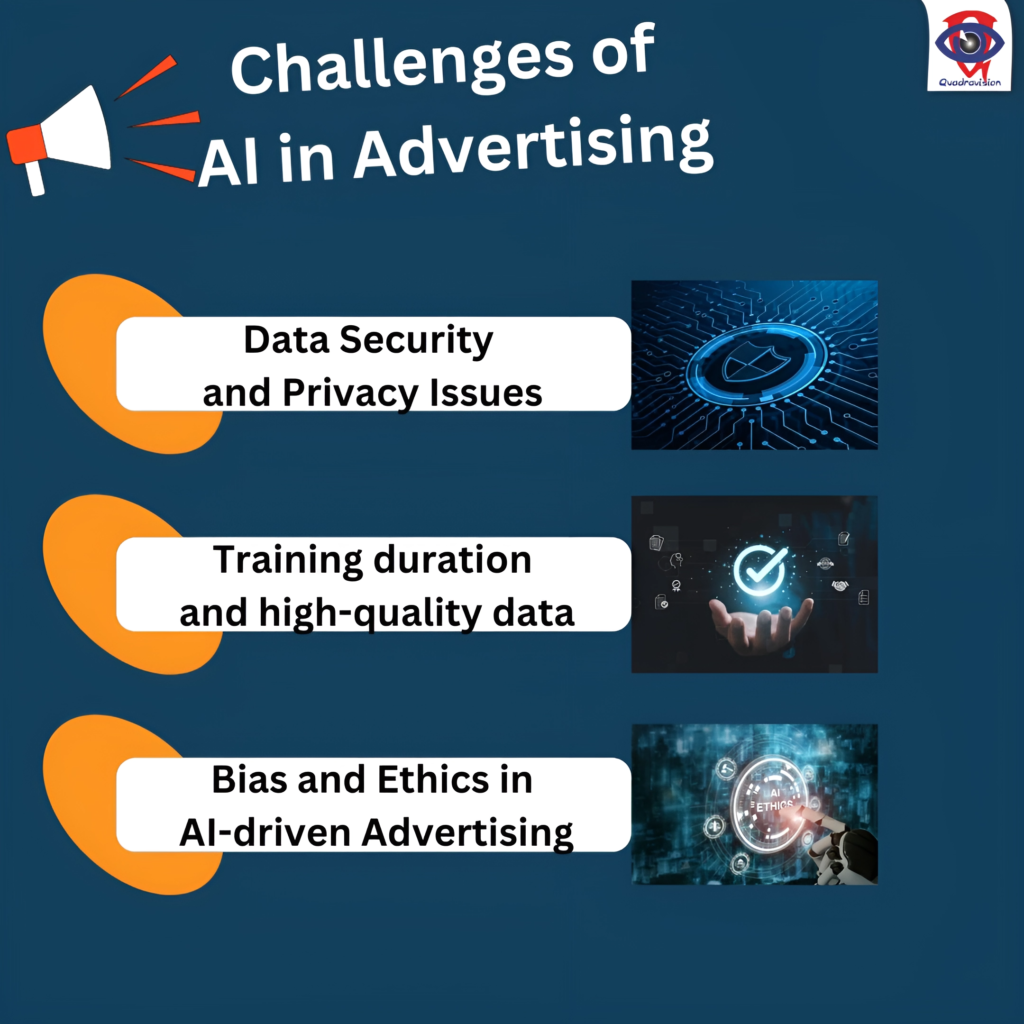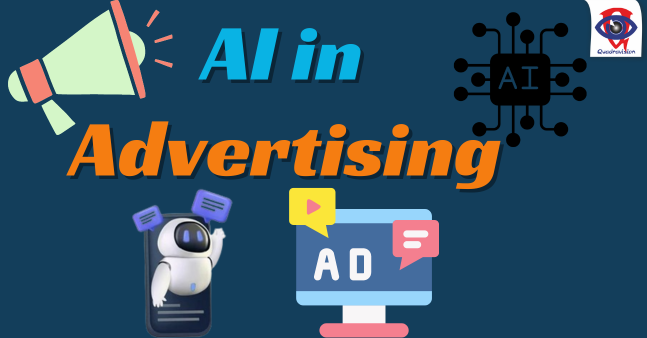Artificial intelligence (AI) has become a vital aspect of many businesses, including advertising. AI technology is always developing, and this has completely changed how marketers interact with their target audiences, maximize the effectiveness of their campaigns, and increase sales. With the use of AI-powered tools and algorithms, advertisers are now able to collect insightful data, automate procedures, and provide individualized experiences to customers on a large scale.
In this blog, we will explore benefits and challenges of AI in advertising, the potential applications of AI in advertising. By comprehending AI’s potential in advertising, we may have a deeper knowledge of the industry’s effect and the options it offers marketers.
AI in Advertising

In recent years, artificial intelligence (AI) has grown beyond a buzzword. It refers to the emulation of human intelligence in computers capable of executing activities that would normally need human cognition. The application of artificial intelligence in advertising has advanced significantly. Initially, advertising relied on traditional mediums like television, radio, and print media. However, with the introduction of the internet, AI gained a foothold in the advertising environment.
Advances in machine learning, natural language processing, and big data analytics have all contributed to AI’s progress. AI algorithms can evaluate large volumes of data, identify patterns, and make predictions or judgments. In the context of advertising, AI technologies are now widely used to improve targeting, personalize adverts, and provide real-time data analysis, transforming the industry. AI plays an important role in automating and optimizing numerous areas of the advertising workflow.
Need of AI in Advertising

In an age where consumers are inundated with information, creating personalized and relevant content is critical. AI introduces a data-driven approach to advertising, enabling agencies to sift through massive volumes of data to uncover patterns, preferences, and trends. This permits the delivery of targeted messages that appeal to certain audiences, resulting in more effective marketing.
Furthermore, AI enables advertising agencies to optimize their tactics by giving real-time insights. From anticipating consumer behavior to assessing market trends, AI systems evaluate data quickly, allowing agencies to make informed decisions on the fly. This level of adaptability is critical in a dynamic profession where timing is frequently the key to success.
Benefits of AI in Advertising

Better Personalization and Targeting
Refinement of targeting and tailored ad delivery are two major benefits of AI in advertising. In advertising, personalization is the process of making an advertisement more relevant to the target audience by utilizing data or consumer insights. These may include demographic data, interests, purchase intents, or patterns of conduct. In order to precisely segment audiences, AI systems examine user behavior, preferences, and historical data.
AI can target ads that are more relevant to specific people by analyzing their intent, which raises the possibility of engagement and conversions. Advertisers may optimize the effectiveness of their advertising efforts with AI-driven targeting and customization.
Enhanced Efficiency and Cost effectiveness
AI simplifies advertising procedures, increasing their effectiveness and economy, therefore it another major benefit of AI in advertising. Time-consuming processes like ad placement, performance tracking, and optimization are automated by AI-powered solutions. This lowers the possibility of human error while enabling advertisers to distribute money more wisely. AI frees up time-consuming duties so that advertising experts can concentrate on strategy and creativity.
This effectiveness increases marketing quality overall while also saving time. Furthermore, AI systems optimize advertising campaigns in real-time to get the best results by continuously learning and adapting. As a result, companies can get higher returns on investment and make the most of their advertising spend.
Real-time Analysis and Interpretation of Data
AI makes it possible to analyze data in real time and offers insightful information about how well ads work. Advertisers may obtain instant feedback on campaign effectiveness, customer engagement, and conversion rates with AI algorithms that process massive volumes of data. Because of this real-time insight, changes and modifications can be made quickly, guaranteeing that advertising activities stay in line with marketing objectives. AI-driven insights enable marketers to make data-driven choices, resulting in more effective marketing campaigns.
Follow us on Instagram to stay updated!!
Challenges of AI in Advertising

Data Security and Privacy Issues
Using AI in advertising gives various benefits, but it has some challenges as well.AI raises privacy and security issues because it depends on enormous volumes of user data. Marketing departments need to make sure that consumer data is used morally and in accordance with regulations (such as GDPR). Companies run the danger of facing harsh fines and harm to their reputation if this is not done. AI can present a problem for this.
Tools may go beyond what is considered appropriate unless they strictly adhere to certain legal requirements. It is imperative for advertisers to comply with legislation and guarantee the secure collection and storage of user data. Addressing privacy problems related to AI-driven advertising requires maintaining transparency and securing user agreement.
Training duration and high-quality data
The processes required to achieve broad marketing goals might not be naturally understood by AI systems. These tools need time to become acquainted with your company’s objectives, your target audience’s preferences, and previous patterns. It’s critical to guarantee data quality in addition to time. Artificial intelligence tools are less effective because they are likely to make poor decisions if they haven’t been trained with accurate, timely, and representative data.
Bias and Ethics in AI-driven Advertising
With the industry depending more and more on AI to segment audiences and manage campaigns, more choices are coming from machines. Despite their best efforts, marketers who use AI technology often lack understanding of how algorithms operate and what biases may be ingrained in these models. Afterwards, decisions might be made that unintentionally convey bias into the campaign due to factors like age, race, or gender. Artificial intelligence tools can lose value if they are not trained with representative, timely, and accurate data. This is because they will make less-than-ideal decisions, that’s why for marketers using AI in Advertising has another significant challenge.
Have you checked our previous blog??? If not click here immediately and explore more.
Application of AI in Advertising
Accurate Targeted Advertising
By using algorithms to analyze vast amounts of consumer data and find patterns and preferences, artificial intelligence (AI) in advertising revolutionizes traditional marketing. As a result, advertisers are able to deliver tailored content that maximizes engagement and optimizes ad spend.
Enhanced Customer Interaction with Chatbots
Chatbots with AI capabilities are essential for customer service. These chatbots, which can comprehend user inquiries and offer prompt assistance, improve the user experience by making tailored recommendations and conversing with users in a manner reminiscent of a human, thus building closer relationships with the viewership.
Market Insights with Predictive Analytics
Predictive analytics is made possible by AI, which gives advertisers the capacity to precisely predict consumer behavior and market trends. With this kind of insight, marketers can better tailor their strategies to the changing needs of the market and make sure their campaigns are not only timely but also relevant.
Future outlook of AI in Advertising
AI in advertising is a rapidly developing field. There’s no shortage of innovation, from chatbots that witty banter with customers to image recognition algorithms that can spot brands in user-generated content. We can anticipate even more astounding innovations that push the limits of what we previously believed was feasible as technology develops.
The use of AI in advertising may cause some job roles to change or disappear. More automated procedures might take the place of conventional ad placement and targeting strategies. But do not be alarmed, Even though AI might make some aspects of advertising more efficient, the advertising industry will always need the human touch, strategic planning, and creative thinking.
Conclusion
To sum up, artificial intelligence (AI) has unquestionably changed the advertising landscape and given marketers previously unheard-of chances to connect and interact with their target markets. Artificial Intelligence isn’t just a pipe dream—it’s already causing a stir in the advertising sector. AI has the potential to change the advertising industry completely, offering more engaging user experiences and better ad targeting, among other huge advantages.
To stay ahead of the curve, the advertising industry needs to embrace these innovations and adapt as AI technology develops. AI is poised to revolutionize the advertising industry with its ongoing breakthroughs and creative applications, resulting in a more individualized, effective, and efficient advertising environment.

